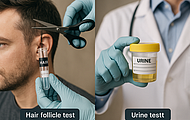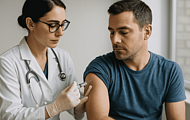Misconceptions About Tuberculosis Testing & PPD Testing

When it comes to workplace health and safety, few topics generate as much confusion as tuberculosis (TB) testing. As employers and individuals alike grapple with the need for accurate health screenings, misconceptions about TB and PPD (purified protein derivative) tests can lead to unnecessary worry and improper procedures. Let's clear the air and tackle some of the most common myths surrounding these crucial health screenings in Columbia, SC and beyond.
Tuberculosis remains a significant public health concern, even in developed countries. Despite advances in medical care, TB continues to affect communities worldwide, making regular testing an essential part of occupational health programs. However, misinformation about TB testing methods, particularly the PPD skin test, can create barriers to effective screening and prevention.
The Truth About TB Transmission
One of the most persistent myths about tuberculosis is that it's easily transmitted through casual contact. In reality, TB is not as contagious as many people believe. The bacteria that cause TB are spread through the air when an infected person coughs, sneezes, or speaks. However, it typically requires prolonged, close contact with an infected individual to contract the disease.
Debunking PPD Test Myths
The PPD skin test is a common method for screening for TB, but it's surrounded by several misconceptions. One prevalent myth is that a positive PPD test means you have active tuberculosis. In truth, a positive result indicates that you've been exposed to TB bacteria at some point in your life, not necessarily that you have an active infection or are contagious.
Who Really Needs TB Testing
There's often confusion about who should undergo TB testing. While some believe everyone needs annual testing, the reality is more nuanced. TB screening is typically recommended for:
- Healthcare workers and first responders
- Individuals who have been in close contact with someone with active TB
- People with weakened immune systems
- Those who have recently traveled to countries with high TB rates
For most people in low-risk occupations and environments, routine TB testing may not be necessary. However, specific industries and job roles may require regular screening as part of occupational health protocols. It's essential for employers to work with occupational health professionals to determine the appropriate testing frequency for their workforce based on risk factors and regulatory requirements.
The Accuracy of TB Tests
Questions about the accuracy of TB tests are common, especially regarding false positives and negatives. While no test is perfect, modern TB screening methods, including the PPD skin test and blood tests like QuantiFERON-TB Gold, are highly reliable when administered and interpreted correctly.
False positives can occur, particularly in individuals who have received the BCG vaccine or have been exposed to other mycobacteria. This is why follow-up testing and evaluation by a healthcare professional are crucial for interpreting results accurately. At Midlands Exams & Drug Screening, we ensure that our testing procedures meet the highest standards of accuracy and that results are interpreted by experienced professionals.
TB Testing and Employment Rights
Many employees worry that a positive TB test could jeopardize their job. It's important to understand that having a positive TB test result does not automatically disqualify someone from working. Employers are required to make reasonable accommodations for employees with medical conditions, including latent TB infection.
The key is proper management and follow-up care. If an employee tests positive for TB, the next steps typically involve further evaluation to determine if the infection is active and, if necessary, appropriate treatment. Most people with latent TB infection can continue working safely while undergoing treatment.
The Role of Ongoing Monitoring
Another misconception is that once you've had a TB test, you're set for life. In reality, ongoing monitoring may be necessary for individuals in high-risk professions or those with known exposure. The frequency of testing can vary based on individual risk factors and workplace requirements. Some key points to remember about ongoing TB monitoring include:
- Annual testing may be required for healthcare workers and others in high-risk professions
- Individuals with latent TB infection should have regular check-ups to monitor for active disease
- New exposures or changes in health status may necessitate additional testing
Regular monitoring helps ensure early detection and treatment of TB, protecting both the individual and those around them. For employers, implementing a consistent TB screening program as part of occupational health services can help maintain a safe work environment and comply with industry regulations.
Navigating TB Testing in the Workplace
For businesses in Columbia, SC, and surrounding areas, understanding the nuances of TB testing is crucial for maintaining a healthy workforce. Implementing a well-designed occupational health program that includes appropriate TB screening can help protect employees, comply with regulations, and dispel myths that may cause unnecessary concern.
By staying informed about the facts surrounding TB and PPD testing, businesses can make confident decisions about their health screening practices. Remember, knowledge is power when it comes to workplace health and safety. Don't let misconceptions stand in the way of protecting your most valuable asset – your employees.
Your Partner in Occupational Health
Navigating the world of TB testing and occupational health screenings doesn't have to be overwhelming. With the right partner, you can ensure your workplace remains safe, compliant, and productive. Midlands Exams & Drug Screening is committed to providing accurate, efficient, and compassionate testing services to businesses throughout Columbia, SC.
Ready to clear the air about TB testing in your workplace? We're here to help. Contact us today to schedule a consultation or call 803-790-2045 to speak with one of our occupational health experts. Let's work together to build a healthier, safer workplace – one test at a time.
‹ Back
.png)
.png)






.png)
